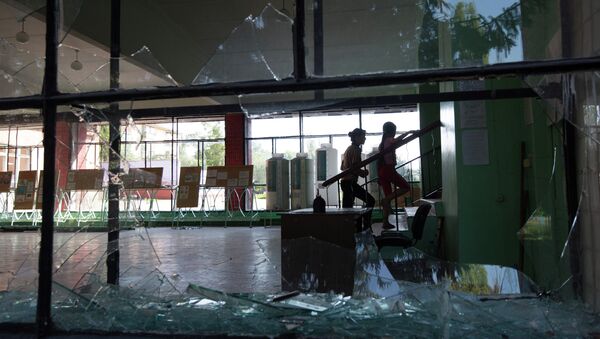DONETSK, September 1 (RIA Novosti) - Scholastic education in the territory controlled by the self-proclaimed Donetsk People's Republic (DPR), will begin no earlier than October 1, DPR Education Minister Igor Kostenok said.
Meanwhile, the children are still going to school in the territory controlled by Kiev, even in Mariupol, a city besieged by the DPR militia forces.
On September 1, no classes will be in session, no students will go to the universities in Donetsk and other cities of the DPR. According to estimates of the DPR Education Minister, only about 10 percent of the pupils are currently remaining in Donetsk, since most of the parents decided to evacuate their children. Moreover, almost half of the schools (47 percent) do not have shelters.
More than 170 kindergartens, schools and universities buildings throughout the Donetsk region have been damaged from the constant bombardment by the Ukrainian law enforcers. Some of them are completely destroyed. The greatest damage occurred in the cities of Shakhtarsk, Horlivka, and Snizhne.
"There are 23 schools, 14 kindergartens, Donetsk National Technical University building and dorms, and they are regularly under attack. Children will not be studying there either on September 1, or on September 15," Kostenok said.
Only 10 percent of pupils included in the lists remain in the DPR by the end of August, Kostenko said. Parents of 5 percent of the pupils have taken them away from the school, 11 percent went to other regions of Ukraine, 20 percent moved to Russia, and 54 percent are in the Donetsk region, but in the quieter cities, presumably controlled by Kiev.
The teachers will come to work on September 1 to prepare the schools for the upcoming year, which over time is still to begin, DPR Education Minister said.
"On the bright side, the education workers - in particular, pre-school educators and teachers - will receive additional 25 percent of the fixed salary, and the scholarships to students will also be increased," Kostenok said.
"The military phase is obviously coming to an end, and our children will soon be listening to their teachers not in shelters, but in bright, warm classrooms equipped with the latest technical equipment and access to the Internet," the minister said.
According to the Regional Department of Education, the decision to postpone the beginning of the school year has already been made in Avdiivka, Donetsk, Makiivka, Horlivka, Shakhtarsk, Yenakiieve, Snizhne, Khartsyzk, Zhdanivka, Kirovske, Yasynuvata, and also in Amvrosiivka, Novoazovsk, Starobesheve, Telmanove, Shaktarsk and Yasynuvata areas.
The beginning of the school year in these cities and areas is scheduled for October 1, but the date is still subject to change, the education ministry stated.
Specialists of the Donetsk Regional Institute of Postgraduate Education developed a special remote training course for those who have nowhere to go to study on September 1. The course should help residents in the area of the special operations with self-education while the schools are not working, the vice-governor of the Donetsk Tamara Lukyanchuk said.
The studies will begin as planned in the areas controlled by Kiev, which include the entire north and west of the Donetsk region and the city of Mariupol in the south.
Pupils from 670 regional schools out of 1091 will begin their studies on September 1, Lukyanchuk said.
Schools in these areas will be able to receive young refugees from Donetsk and other war-torn areas, however, provided that their parents managed to send applications in time, Lukyanchuk said. The majority of such students now remain in Sviatohirsk and Krasnyi Liman in the north of the region, as well as in Pershotravnevyi area in the south of the Donetsk region.
Additionally, the entrance exams for high school seniors and sessions for students, interrupted in June and July due to the fighting near Donetsk, have been extended to September. The deputy head of the region said that the school year for students will begin on October 1, and only on condition that their lives are not in danger.
Since mid-April, Kiev authorities have been carrying out a military operation the east of Ukraine directed against those who refuse to recognize the legitimacy of the new government after the February coup. According to the UN estimates, almost 2.6 thousand people have died since that time, and about 6,000 have been injured.
Moscow has repeatedly condemned the military operation and called on the international community to take all possible measures to stop the fire.

